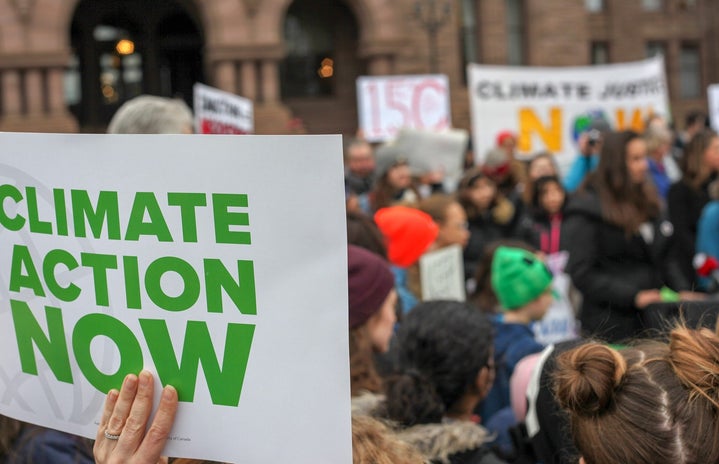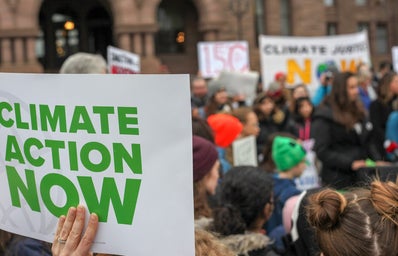With vast turnouts at global climate strikes this year and a fast-approaching Canadian federal election, climate change is one of the biggest factors students are taking into consideration when heading to the polls.
Millions of people marched in global climate strikes held around the world on September 27 to protest their government’s inaction toward climate change.
In Toronto, many students, families and concerned citizens gathered at Queen’s Park with signs and chanted, demanding all levels of government to take action against major climate change issues, like rising greenhouse gas emissions and melting polar ice caps.
Kaitlin Rizarri, a fifth-year business and law student at Ryerson University, was among the protesters at the march.
“It was good to see that amount of mobilization but I just hope that people will vote accordingly,” Rizarri said.
She believes it is important for students to vote because their voices are often underrepresented in parliament due to being overpowered by corporate lobbyists.
There are currently 410 in-house corporate lobbyist groups registered with the Office of the Commissioner of Canada, who work to influence the Canadian government.
“I would never vote for a party that didn’t take climate change seriously or was a climate denier,” Rizarri said.
Daniel Martinez, a fourth-year sociology student at Ryerson, also attended the march and believes students need to take into account how different political leaders plan on addressing climate change since he thinks some parties’ platforms are not doing enough.
“A lot of students are engaged in climate issues because they know they’re going to be the ones that have to deal with it and seeing what some parties have to offer, it doesn’t look like they’re taking it as seriously as we need to,” Martinez said.
The Intergovernmental Panel on Climate Change released a report in 2018 which said global temperatures are likely to increase 1.5 degrees Celsius between 2030 and 2052 if they continue to rise at the current rate. The report suggests the planet needs to cap its temperature at this number in order to maintain a sustainable environment.
One of the things Rizarri is looking for this election is a party that invests in urban farming, green technology and reducing emissions among other things. Rizarri supports the idea of having a carbon tax and is not in favour of the Conservatives’ threats to remove it.
The carbon tax is a price set by the federal or provincial government for every ton of carbon that industries and households emit. People who support this idea believe putting a price on fuels which harm the planet will force industries and people alike to reduce their greenhouse gas emissions and consider greener fuels.
However, throughout the course of his election campaign, Conservative leader Andrew Scheer has said he would scrap the carbon tax if elected.
“To completely scrap it, all it’s doing is protecting the one per cent and not our planet,” Rizarri said.
Maria Jude, a fifth-year nutrition student at Ryerson, will also support a government which helps to get rid of fossil fuels. She wants government to push for more traffic reduction and cut out subsidies to meat industries.
“The government should be reducing, or even cutting out entirely, subsidies on meat so that doesn’t go toward cutting down the rainforest just to grow and produce more meat,” Jude said.
Martinez shared a similar sentiment. “I think the government should really be open and transparent about how harmful animal agriculture is and how everyone can do their part to reduce their consumption or eliminate it entirely,” he said.
Greta Thunberg, a 16-year-old climate change activist, has recently been put at the front of the climate change movement after her speech at the United Nations Climate Action Summit went viral. While Rizarri thinks that Thunberg’s work is respectable, she believes Indigenous people deserve to be at the forefront of the movement.
“We have issues listening to Indigenous leaders that have been advocating for this their entire lives,” Rizarri said.
Jude does not support Trudeau’s Trans Mountain pipeline project which spans across British Columbia and Alberta, crossing over many Indigenous lands.
“Indigenous rights include climate change justice,” Jude said.
Trudeau needs to do more for Indigenous people, such as blocking the corporations polluting Indigenous waterways, she said.
“There were many occasions where he could’ve cleaned up the waterways and prevented corporations from doing more damage but he did not,” Jude said. “It would be really unfortunate if he actually continues in that way.”
Among other issues, Rizarri and Jude are also looking to vote for parties with good education plans for students.
Rizarri is also passionate about the pro-choice movement and ensuring the safety of sex workers. Jude values food security and its intersection with poverty.
Regardless of the outcome of the election, Martinez believes people need to keep fighting. “If you want effective change, you’re gonna have to work with whoever is elected,” he said.
“Definitely vote, but don’t undermine individual change because individuals perpetuate systems and we need to understand what we’re bringing forward to these new reforms when we’re addressing this stuff,” Martinez said.
The city of Toronto declared a climate emergency and a target of net zero greenhouse gas emissions on Tuesday, just a few days after the protests.
The federal election will be held across Canada on October 21. However, Ryerson students can vote on campus at Ryerson’s Student Campus Centre as early as October 5.



